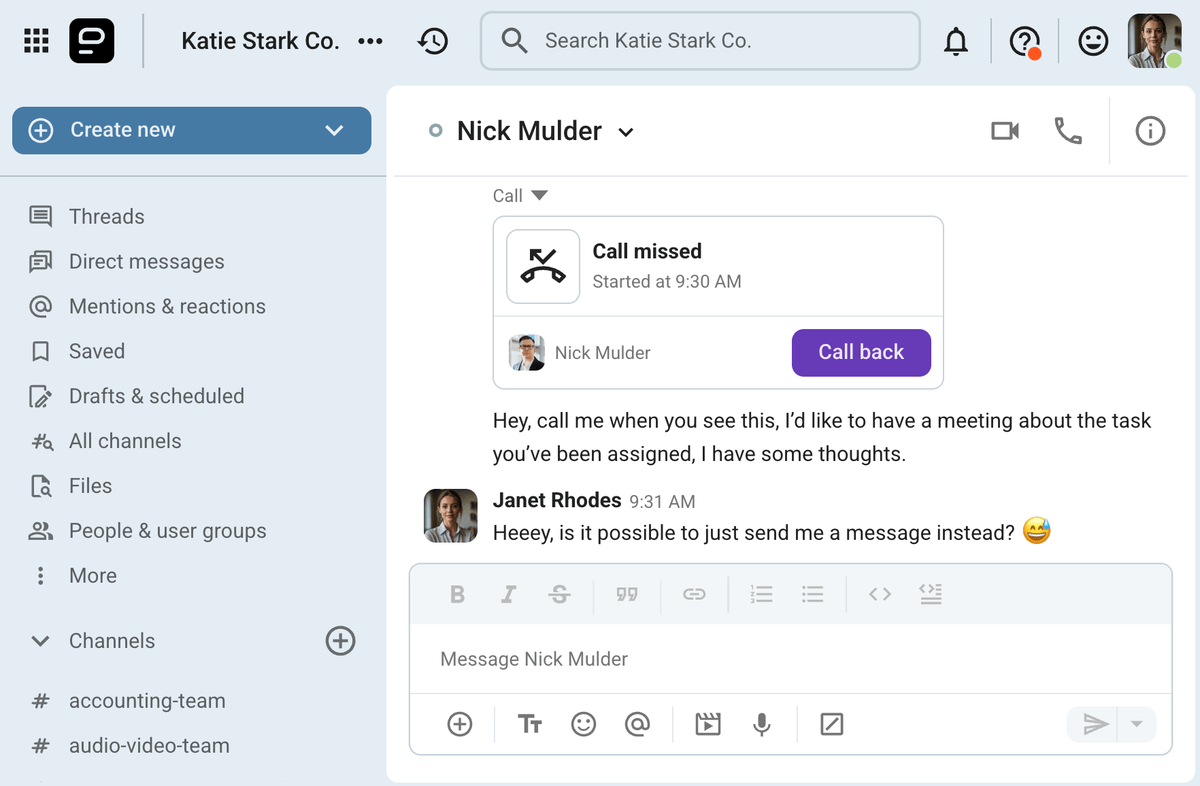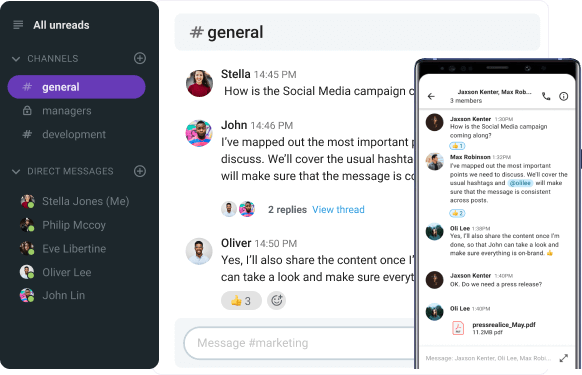Does the thought of work meetings fill you with dread?
Do you stay up at night thinking about having to present at a meeting?
Do you feel that all your teammates can see you struggling to keep your composure as you’re delivering a simple update at a team meeting?
If you answered “Yes” to these questions, you might be struggling with meeting anxiety.
The good news is — you can manage it.
But before we get into the top 10 tips for overcoming meeting anxiety, we’ll go over the common reasons you might get nervous speaking in meetings.
Let’s dive in!

What is meeting anxiety?
Meeting anxiety can be defined as an excessive fear of attending or speaking in work meetings.
One 2023 Craft survey showed that 80% of participants feel anxious before a meeting. However, excessive worry and discomfort can also occur during and after work meetings.
What’s more, meeting anxiety isn’t limited to in-person meetings. On-camera virtual meetings — although beneficial for team connection and collaboration — can be particularly draining for people dealing with this issue.
In fact, the latest meeting statistics show that 45% of professionals chose audio-only meetings as the preferred virtual meeting format.
However, some people also experience anxiousness during audio calls, which can explain why 72% of the Craft survey participants believe that the key to productivity is asynchronous communication. They believe (or wish) that most of their meetings could be replaced by written communication.
Some even go out of their way to avoid in-person or virtual meetings altogether, as shown in the example on the business messaging app, Pumble.

Communicate in real time and asynchronously with Pumble
Now, you might think that meeting anxiety only rears its ugly head when people need to facilitate a meeting. However, fear of facilitating meetings is different than meeting anxiety, which:
- Lasts longer,
- Has more severe symptoms, and
- Has a much more pronounced impact on the work life of individuals experiencing it.
People who struggle with meeting anxiety experience intense symptoms in every meeting they attend. On the other hand, people who don’t feel comfortable facilitating meetings only struggle when they are assigned a facilitator role in a meeting.
How can anxiety in meetings impact you?
Meeting anxiety affects people’s ability to remain fully present and pay attention during meetings.
Excessive worry and an overwhelming sense of discomfort impact their performance and appearance during a meeting and a few hours after the meeting has ended.
The most common physical symptoms of meeting anxiety include:
- Shaking and trembling,
- Blushing,
- Fast heartbeat,
- Sweating,
- Nausea, and
- Dizziness or lightheadedness.
Meeting anxiety can also cause several unpleasant emotions and thoughts, such as:
- Feeling incompetent or less than,
- Worrying about how you look or sound during meetings,
- Feeling embarrassed about blushing or shaking,
- Worrying about being judged,
- Being self-conscious about asking tough questions or speaking in a meeting,
- Worrying about sounding unprepared, and
- Feeling drained after the meeting.
If you recognize these symptoms in your regular work meeting routine, you might be suffering from meeting anxiety.
While your first impulse might be to avoid participating in meetings altogether, there are far more constructive ways to manage and even overcome meeting anxiety.
Let’s start by dismantling the root of the problem.
Why do meetings make you anxious?
Before we get into actionable solutions for overcoming meeting anxiety, let’s first outline some of the main reasons work meetings make you feel anxious in the first place.
Reason #1: Social anxiety
People struggling with social anxiety are more likely to experience anxiety symptoms during work meetings.
If social situations make you feel overly uncomfortable and you find yourself worrying before, during, and after them, chances are work meetings will produce the same reactions.
You’ll often catch yourself being more focused on (and worried about) how others perceive you than the actual conversation in the meeting.

Check in on your coworkers over Pumble
Reason #2: Fear of public speaking
If you experience intense fear and anxiety when you need to speak in work meetings, it may be related to the fear of public speaking — glossophobia.
People who fear public speaking often feel comfortable in one-on-one meetings and social situations in general. However, they will experience intense discomfort when they need to speak in front of a group in a more formal setting.
For example, an all-hands meeting like the one shown below might cause them severe anxiety, especially if they have to present something.

Reason #3: Lack of preparation
Not having enough time to prepare for a meeting can cause your anxiety to spike. It leaves you not knowing how to start your presentation, what to say after your “grand” opening, or how to end it without sounding awkward.
What’s more, working remotely often requires juggling multiple roles and responsibilities, which can affect how much time we have to prepare for a meeting.
Back-to-back meetings also leave no time to prepare properly and can cause meeting burnout, stress, and meeting anxiety.
The same goes for getting last-minute meeting invites with no prior notice.
Lack of preparation can make you feel out of control of the situation and cause tremendous discomfort and anxiety.
💡 Pumble Pro Tip
Presenting at a meeting is often more stressful than just attending one, which is why preparing for a presentation is vital. To get the best tips on preparing for speaking in front of your coworkers, check out the article below:
Reason #4: Unclear expectations
Meeting anxiety can also stem from insufficient information about the purpose of the meeting.
Not having a clear meeting agenda with defined objectives and meeting roles can cause your mind to spiral about all potential scenarios and things that can go wrong.
💡 Pumble Pro Tip
Not sharing a meeting agenda with all participants is a big corporate no-no. To avoid making that mistake, always prepare a meeting agenda beforehand. You can use one of our templates:
Boost your meeting efficiency with Pumble
Reason #5: Poor communication skills
If you feel your communication skills may not be up to par, you can experience increased worry and anxiety about speaking in meetings.
You may fear you’ll fail to get your message across effectively and cause miscommunication or experience judgment from other people in the meeting.

Reason #6: Imposter syndrome
If you feel inadequate and doubt your knowledge and intellectual ability while feeling intense pressure to perform, you might be experiencing imposter syndrome.
Imposter syndrome is another common cause of meeting anxiety.
People experiencing imposter syndrome often feel like frauds in a professional setting. Naturally, meetings where they need to present an opinion in a discussion will usually exacerbate these negative feelings and self-beliefs.
Reason #7: Poor self-image
If you struggle to maintain a positive self-image and healthy self-esteem, you might find video conferencing extremely uncomfortable.
People who struggle with poor self-image are often too self-critical about how they look and sound. On-camera meetings require spending plenty of time looking at your reflection on the screen, which can cause anxious feelings and behavior.
In the Pumble example below, we see Maya avoiding looking at herself on her screen. While this might help with her anxiety, it can also give her interlocutor the impression that she’s disinterested in the conversation.

Explore Pumble’s Video Conferencing features
💡 Pumble Pro Tip
If you specifically worry about your physical appearance during online meetings, we have a few tips for you:
Reason #8: Previous negative experience
If some of your past meetings went exceptionally bad, you might project these negative emotions to all meetings, which can result in the development of meeting anxiety.
Maybe you had a negative experience with difficult conversations you didn’t know how to handle. So, now you feel a sense of dread each time you get a meeting invite, fearing something similar may happen.
Or, you might have experienced technology malfunctions, and now you fear your conference platform will disconnect in the middle of the meeting.
Try Pumble for seamless, uninterrupted communication
How to overcome meeting anxiety?
Overcoming meeting anxiety is possible — however, it takes practice.
Here are some valuable tips and strategies to overcome the fear of speaking in meetings.
Tip #1: Focus on what you can control
Anxiety is often connected to feeling out of control of the situation.
This is why it’s particularly pronounced when you don’t feel ready for a meeting or fear technology will fail you in the middle of your presentation.
To ease your mind before the meeting, come up with a plan to address the conditions you have control over.
Start by blocking off some time in your calendar before the meeting to prepare. If you anticipate a particularly busy day, try to prepare the day before.
Go over the meeting agenda and think of potential questions or issues that may come up. Don’t hesitate to reach out to the meeting host or facilitator and ask for more information about the purpose of the meeting and potential discussion points.

Do some research to feel more confident and comfortable discussing related topics.
Get your background and yourself camera-ready.
Working on conditions you have power over puts your mind at ease and calms your anxiety by introducing a sense of control over the situation.
However, be mindful not to fall into the trap of over-preparation, as it can reinforce anticipatory anxiety. Planning for every small detail and potential scenario can have the opposite effect and leave you feeling hypervigilant.
Tip #2: Reframe self-limiting beliefs
In most cases, we can trace the anxious episode back to the start.
If you struggle with meeting anxiety, you may notice your thoughts usually start to spiral out of control a few minutes before the meeting.
To ease the intensity, try to catch your negative self-talk before it gathers momentum.
So, when you notice the limiting thoughts start getting louder, try the following approach:
- Pause to analyze these thoughts. Ask yourself if these beliefs are the default subconscious negative program running on repeat or if there’s any actual evidence to back them up.
- Introduce a more accurate version of this thought. Reframe the negative with a counterthought or a belief, aka a positive affirmation.
A 2024 study about the impact of positive thinking on anxiety revealed that positive pictures or words can be beneficial in decreasing anxiety and worry and increasing overall happiness.
So, before every meeting, when you feel those anxious thoughts start to twirl in your head, try to replace them with something more positive.
In the table below, you’ll find some examples of how you can do that.
| ❌ Limiting thought | ✅ Supporting thought |
|---|---|
| I’m not good enough to present in this meeting. | I clearly have something valuable to contribute, or I wouldn’t have been invited to the meeting. |
| I look/sound awkward. | I’m authentic and unique, and that is OK. |
| I’ll freeze when someone asks an unexpected question/offers negative feedback. | I can handle challenging situations/difficult conversations. |
| I’m always nervous in work meetings. | I care about my work and want to do my best to perform well. |
| I don’t have enough information about the purpose of the meeting/discussion topics. | I have enough time to prepare and research. |
| I talk incoherently, and I’ll cause confusion. | I can practice my verbal skills and become a more effective communicator. |
When working to overcome meeting anxiety, it’s important to remember that negative self-beliefs won’t necessarily disappear immediately.
However, by introducing alternative thoughts, you’ll gradually start to shape a more objective view of yourself, and new beliefs will begin to form, making your anxiety less paralyzing.
💡 Pumble Pro Tip
To improve your self-regulation and reduce stress at work, consider improving your emotional intelligence. Get all the details in the Pumble blog below:
Tip #3: Take care of yourself during meetings
In some instances, you may feel your anxiety overpowering your ability to manage it.
When that happens, try to take care of yourself — remember that it’s ok to give yourself grace and resist the urge to push further when things get overwhelming.
Focus on doing what’s best to help yourself at that moment, for example:
- If your blood sugar drops, eat a snack or have a fruit beverage.
- Turn your camera off for a while, if you feel overwhelmed.
- Practice positive self-talk. Repeat supporting thoughts in your mind, or have them in writing in front of you.
Practicing self-care during your work meetings can help keep your anxiety at bay.
If your company uses a team communication app like Pumble, you can use its reminders feature to quickly access your positive affirmations in writing, as in the example below.

Use Pumble to set reminders for yourself
Tip #4: Practice stress-management techniques
If you suffer from chronic meeting anxiety and stress, you might benefit from a regular stress-management technique.
Once the stress response is already on the way, it’s more difficult to diffuse it immediately. But, if you practice calming techniques consistently, your mind will be more accustomed to being at ease. This will reduce the severity of your meeting anxiety symptoms.
Some examples of stress-management techniques include:
- Deep breathing,
- Meditation,
- Yoga (and exercise in general),
- Eating well,
- Getting enough sleep,
- Making time for hobbies,
- Taking regular breaks, and
- Talking openly about your stress with friends and family or in therapy.
Start by introducing these techniques one by one until you feel comfortable creating a routine that works best for you.
Tip #5: Be mindful of where you put your focus and attention
If you struggle with meeting anxiety, you can often find yourself focusing entirely on the reaction of others instead of being in your own body and mind.
By doing that, you base your meeting performance on the reaction of others. And you do this entirely unconsciously — it’s like you have an unconscious bias against yourself.
To calm your anxious response in these situations, you need the help of the parasympathetic nervous system to refocus your attention. You can activate it in several ways:
- Before a meeting — Splash some cold water on your face, breathe deeply for a few minutes, or call a friend or a loved one who can help you center and relax.
- During a meeting — Focus on your posture to return your attention inward. Lean back in your chair or place your hands on your desk or your chair handle. Get a fidget spinner or a stress ball and use it during meetings.
- After a meeting — Reframe your thoughts with cognitive reframing techniques. Challenge your negative or irrational thoughts and replace them with more realistic perceptions of the situation.
All of these techniques can help calm your nervous system and refocus your attention on the topics and ideas discussed in a meeting.
Tip #6: Practice public speaking
If you have anxiety speaking in meetings and a fear of public speaking in general, try to fake it until you make it.
Namely, treat any public setting as an opportunity to practice your communication skills and act as if you already have them.
Book clubs, company get-togethers, team-building exercises, conferences, or networking events are all great ways to nudge yourself out of your comfort zone and practice speaking in public.
It may sound scary at first, but each new experience is a step in the right direction toward becoming a more confident speaker.
- Take small steps to get started. Practice introducing yourself at social events, for example.
- Tell stories at group gatherings to break the bad communication habit of always staying silent.
- Try to ask for help at work when you need it. Start with a few simple favors and work your way up to something more substantial.
- Consider taking acting classes or online communication courses to practice.
As you accumulate enough corrective experiences, your mind will start to realize that there’s no actual danger to be hypervigilant about. You’ll gradually become more comfortable speaking in meetings.
💡 Pumble Pro Tip
Being confident when speaking in front of others is one of the main characteristics of effective communication. To find out more about it and get some tips on how to become a better communicator, check out the article below:
Tip #7: Focus on the purpose of the meeting
When you focus solely on yourself and how you come across to others, it’s easy to start spiraling.
One of the ways to stop feeling overly self-conscious is to try to refocus your attention on the purpose of the meeting.
Remember that your purpose and mission in meetings are less about you per se and more about your contribution to conversations. You’re not there to be judged but to offer service, value, and your point of view.
Take a look at the example shown on Pumble, an internal communication app. Before the exchange you see below, a meeting took place in which Jessica expressed worry about an issue she was having.
Her coworker, Nick, knows how Jessica could solve the issue. However, his fear of speaking in a meeting stopped him from sharing his solution, and he opted to send her a direct message afterward.

Share files easily over Pumble
Instead of letting his meeting anxiety take over, Nick could have reminded himself that it would be more beneficial for everyone if he shared the info in the meeting.
Tip #8: Highlight your strengths
To manage your social anxiety in work meetings, you can shift your focus toward your strengths.
Sure, meeting anxiety can be limiting, and it can certainly hinder your efforts to become a confident and eloquent speaker.
However, in most cases, meeting anxiety comes with the gift of being a great listener and having excellent attention to detail.
If you tend to listen and observe more than you speak in meetings, you can gain more insight and clarity about the issues discussed.
You can then give more meaningful input when it’s your turn to share feedback.
Therefore, instead of dwelling on the negatives, use your ability to listen attentively as an advantage.
Tip #9: Use visuals
As we mentioned earlier, meeting anxiety can cause an intense response — especially if you need to present to a group.
If you feel these intense feelings coming up as you prepare to present in an upcoming meeting, consider incorporating visual tools in your presentation.
Anything from slide presentations, images, videos, or screen sharing will do the trick of taking the spotlight off of you.
Even if you can’t spend the entire presentation off-screen, you’ll still be able to take a breather and recover cognitively.

Share your screen seamlessly with Pumble
Tip #10: Embrace the discomfort
Finally, to eventually overcome meeting anxiety, you’ll just have to sit with the discomfort for a little while.
“You gotta feel it to heal it,” as the saying goes.
In most cases, our first impulse is to avoid the situations that trigger our anxiety.
With meeting anxiety, this can look like avoiding attending meetings entirely. Or, if you have no choice, attending the meetings but engaging in different sorts of avoidance behaviors such as:
- Avoiding speaking in meetings,
- Overpreparing,
- Avoiding eye contact, looking away in the distance, and
- Covering your mouth or lowering your voice when you talk.
According to the professional literature on avoidance behavior in anxiety, avoidance actually reinforces anxiety, in addition to restricting your life in many areas.
Instead of overpreparing for any potential scenario that may come up during the meeting, start by going to the meeting with the mindset that you can trust yourself to handle anything that comes up.
And, so what if others notice you’re a bit nervous? Welcome the feeling of uneasiness and let it pass.
As Susan David, a Harvard Medical School Psychologist, speaker, and author, highlighted in her TED Talk:
“You don’t get to have a meaningful career, or raise a family, or leave the world a better place without stress and discomfort. Discomfort is the price of admission to a meaningful life.”
Disclaimer
The examples and tips provided in this article are not substitutes for professional treatment. If you suffer from intense social anxiety, you might find these tips valuable only in combination with professional treatment prescribed by a licensed medical professional.
Schedule meetings with Pumble and overcome your meeting anxiety
To truly overcome meeting anxiety, you need to use all the tools at your disposal — including communication tools.
Pumble, an all-in-one team communication and collaboration app, can help you in your battle with meeting anxiety and lend an extra helping hand.
With it, you’ll be able to better apply all the tips from our blog, most notably:
- Controlling the meeting environment — thanks to its easy-to-use video conferencing feature, you’ll have full control over the meetings you conduct via Pumble,
- Reframing self-limiting beliefs — with the Pumblebot feature, you can send or schedule positive affirmations for yourself that will help you ease your pre-meeting anxiety, and
- Using visuals — the screen sharing feature will allow you to present at the meeting without a hitch!
And don’t be discouraged if some meetings still don’t go as smoothly as you hoped. Remember that rewiring anxious beliefs takes time, but you have all it takes to do it.
Boost your confidence and get rid of your anxious thoughts👇








